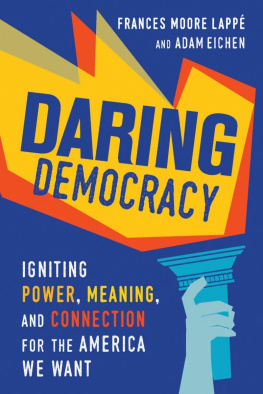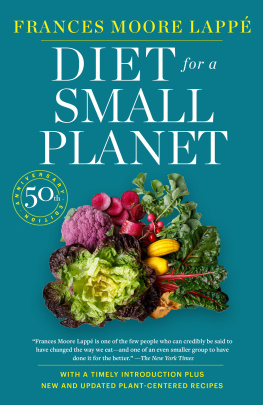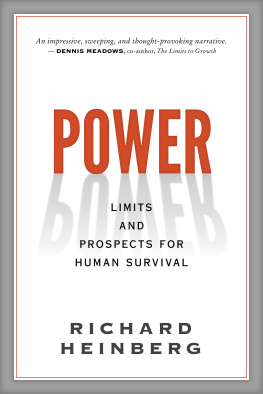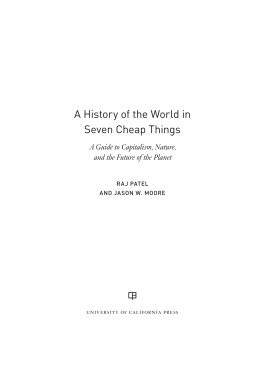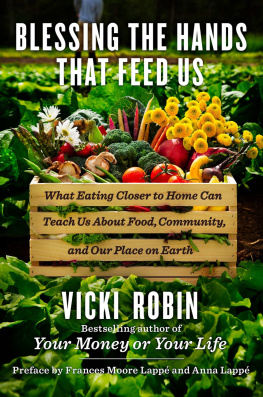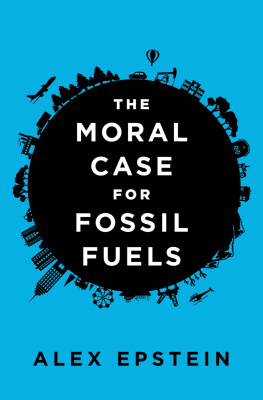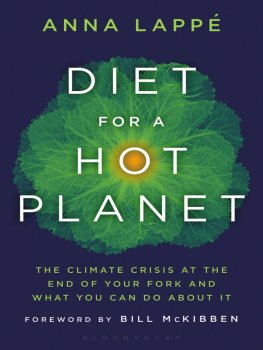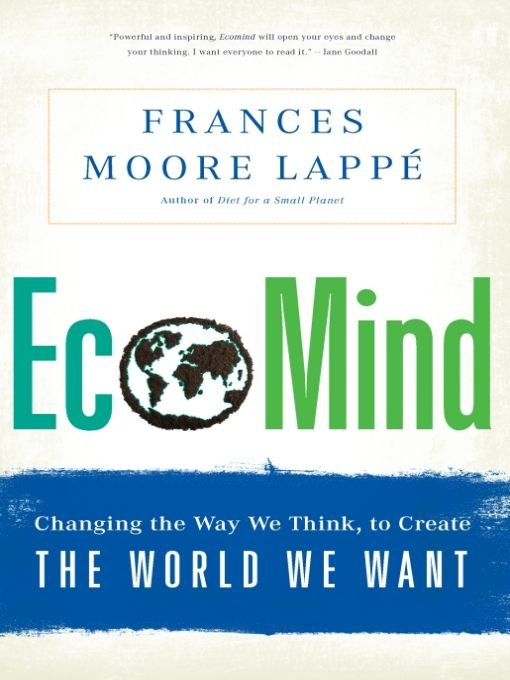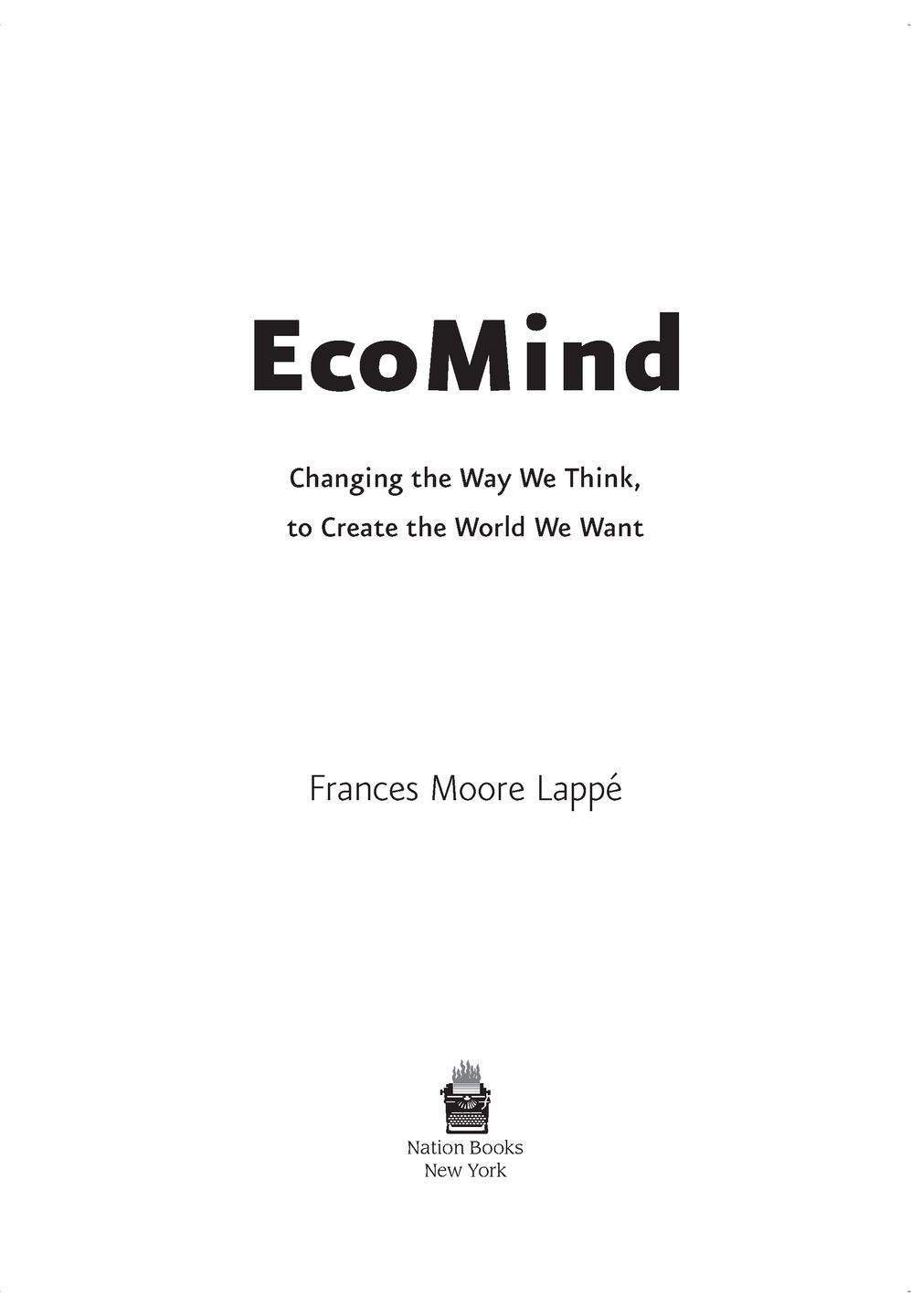Table of Contents
Also by Frances Moore Lapp
Aid As Obstacle (with Joseph Collins and David Kinley)
Betraying the National Interest
(with Rachel Schurman and Kevin Danaher)
Democracys Edge: Choosing to Save Our Country
by Bringing Democracy to Life
Diet for a Small Planet
Food First: Beyond the Myth of Scarcity
(with Joseph Collins and Cary Fowler)
Getting a Grip: Clarity, Creativity and Courage
for the World We Really Want (2nd ed.)
Great Meatless Meals (with Ellen Ewald)
Hopes Edge: The Next Diet for a Small Planet
(with Anna Lapp)
Mozambique and Tanzania: Asking the Big Questions
(with Adele Beccar-Varela)
Nicaragua: What Difference Could a Revolution Make?
(primary author, Joseph Collins; with Paul Rice)
Now We Can Speak (with Joseph Collins)
Rediscovering Americas Values
Taking Population Seriously (with Rachel Schurman)
The Quickening of America: Rebuilding Our Nation,
Remaking Our Lives (with Paul Martin Du Bois)
What to Do After You Turn Off the T.V.
World Hunger: Twelve Myths
(with Joseph Collins, Peter Rosset, and Luis Esparza)
You Have the Power: Choosing Courage in a Culture of Fear
(with Jeffrey Perkins)
For Ida and Josie, and your grandfather Marcs courageous vision
WHY I WROTE THIS BOOK
A FEW YEARS AGO I WAS ASKED TO SPEAK IN WASHINGTON, DC, AT A BIG conference on the global environmental crisis. A lot of my heroes would be presentingnearly sixty speakers in just a couple of days.
Wow, I thought, this is bound to be just the crash course I need to make me more effective in addressing the problems I care most about. How convenient.
I did learn a huge amount in those two days. But as I walked out of the auditorium after the final speaker, something hit me. Actually, I felt that something had just hit me. I felt numb and heavy, very heavy. Reflecting on the experience, I noted that as the conference had worn on, the audience had wound down. I wondered what the departed ones were feeling when they left. Were they overwhelmed, stuffed so full of scary data that they felt stuck?
If others were experiencing what I was, it was not a good thing. Psychologists have found that if we believe there is no hope of overcoming a problem, many of us assume an uncaring posture to protect ourselves. And if Id learned one thing over years studying the food and environmental crises, its that our way out of this mess is inconceivable without the active engagement of millionswell, no, billionsof us who do care. So, our earth cant afford overwhelmed, discouraged people who are too depressed to engage.
[Note All URLs mentioned in this book are available
on our website at www.smallplanet.org. ]
Arriving home after the conference, I was deeply troubled and asked myself, Are we environmentalists actually defeating our own ends? Just when the magnitude of our environmental crises is becoming clearer by the day, are we pushing people to despair?
This question seized me.
I believe that human beings are by nature doers. Most of us love to solve problems. Without that core trait, our species could never have created our complex societies. (Forget the wheel. Forget the steam engine. Forget decoding the human genome.)
But over decades, Ive also come to appreciate that central to our ability to solve a problem is how we perceive the challenge, how we frame itthat seeing determines our capacity for doing, and certainly for effective doing. So I asked myself, Is there a way of perceiving the environmental challenge that is at once hardheaded, evidence based, and invigoratingone that welcomes us to become engaged problem solvers? Might it be possible to transform something that can feel so frightening as to make us go numb into a challenge so compelling that billions of us will eagerly embrace it?
Soon I was searching for answers to that question. I began dissecting the core assumptions behind dire media messages and texts and, more broadly, those ideas relevant to the environmental challenge that float, unnamed but potent, in our culture.
Within a couple of months Id stirred up the guts to test the water. I decided to try out what Id been learning on participants at a relocalization conference in central Massachusetts. As I knew I was questioning the no-growth, consumerism-is-the-problem messages dear to the hearts of many in my audience, my nervousnessthe perspiring browwas impossible to hide. But to my surprise, and huge relief, the audience responded with excitement. They peppered me with many great questions, pushing me on.
That speech became the seed of this book, which first sprouted in the fall of 2009. Thats when I decided to do something Id never before thought of: ask my readers for help. Not only was my plate full with another books release, but I knew my ideas were still forming. I wasnt ready to publish a final version of my ruminations. I also recognized that the essence of that first speech, and this book, was not the facts of the environmental crisis, in which it is the voices of the experts that matter. The discussion here has to do with the way we think about the facts and therefore what we do with them. So its something to which anyone could usefully contribute.
I put out a draft of my ideas, distributed via the website of the organization my daughter, Anna Lapp, and I runthe Small Planet Instituteand at talks I was giving. I asked readers simply, How do I make it a better book? I had no idea what would happen, but since then readers have contributed enough comments to fill another small book. Study groups formed to confer together on feedback, and several professors used the draft in their classes. In all, I was profoundly moved by peoples generositytheir willingness to give their time and effort. This is, in todays lingo, truly a crowd-sourced book.
Not only did Ithat is, the bookbenefit enormously from the insights of readers, but with their help I became even more convinced that what had so deadened my spirit after that environmental conference could be transformed. We dont have to keep telling ourselves a story that robs us of the energy we need now, more than ever. We can each make the leaps of mind that move us from discouragement to an empowering stance. We can each reframe our thinking and seeing in ways that give us energy to engage.
Get ready.
OUR CHALLENGEDEVELOPING AN ECOMIND
So where are we going? And why are we in a handbasket?
SEEING THIS BUMPER STICKER ON MY WAY HOME ONE EVENING, I chuckled aloud. Wait, I thought, thats what Im trying to figure out. It sure seems like the question wed all want to answer.
After all, our earth is now warmer than its been in 650,000 years, and MIT scientists tell us that our planets future heating will likely be twice as severe as estimated less than a decade ago.
But warming doesnt really capture whats happening. Our climate is becoming more chaotic. Think Los Angeles hitting a record 113 degrees in the fall of 2010, then a few months later Oklahomas wind chills sinking to 31 degrees below. Or monsoon rains swelling the Indus River in 2010 to forty times its normal volume, flooding one-fifth of Pakistans land and displacing millions. Or Australia in 2006 suffering its worst drought in 1,000 years, only to face flooding over an area the size of Texas just four years later.


